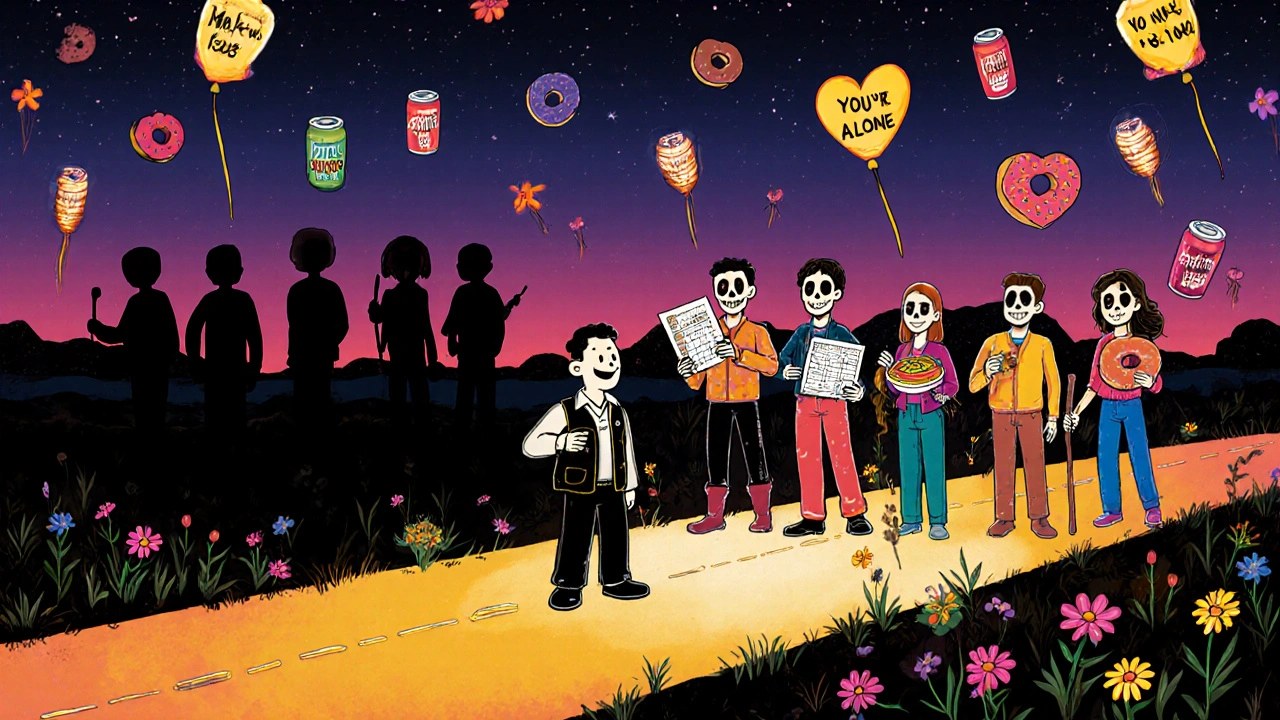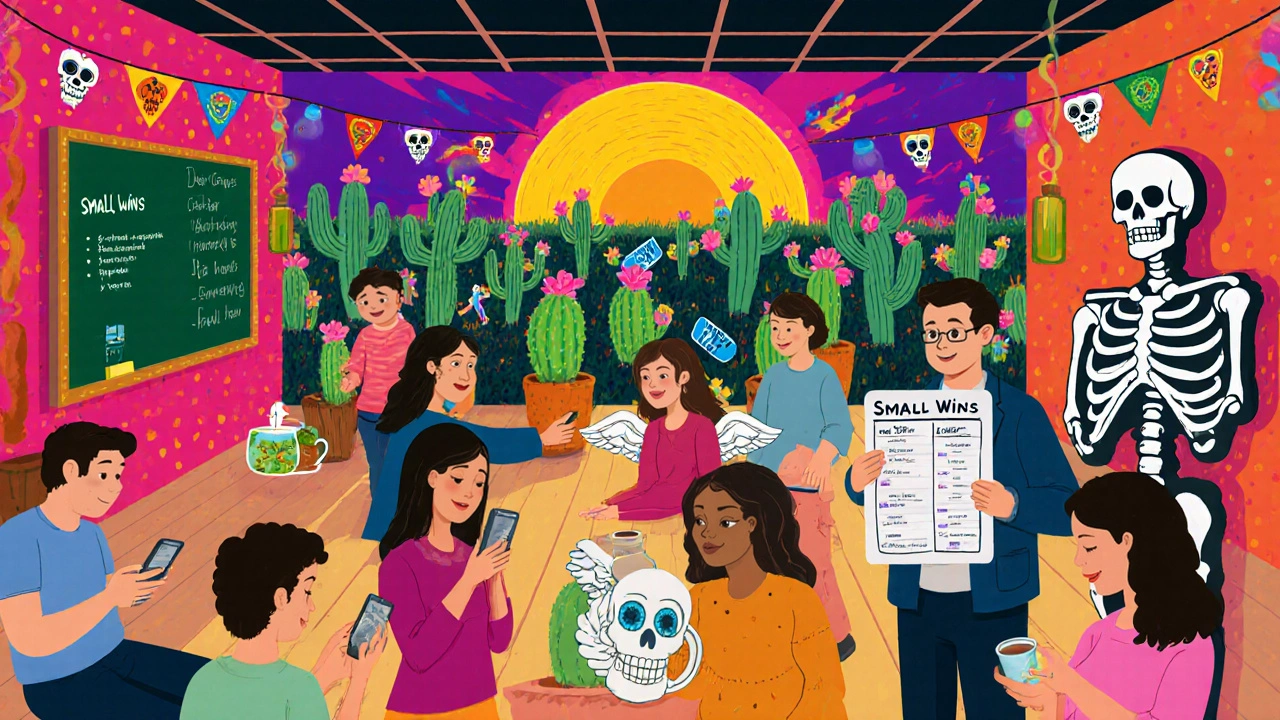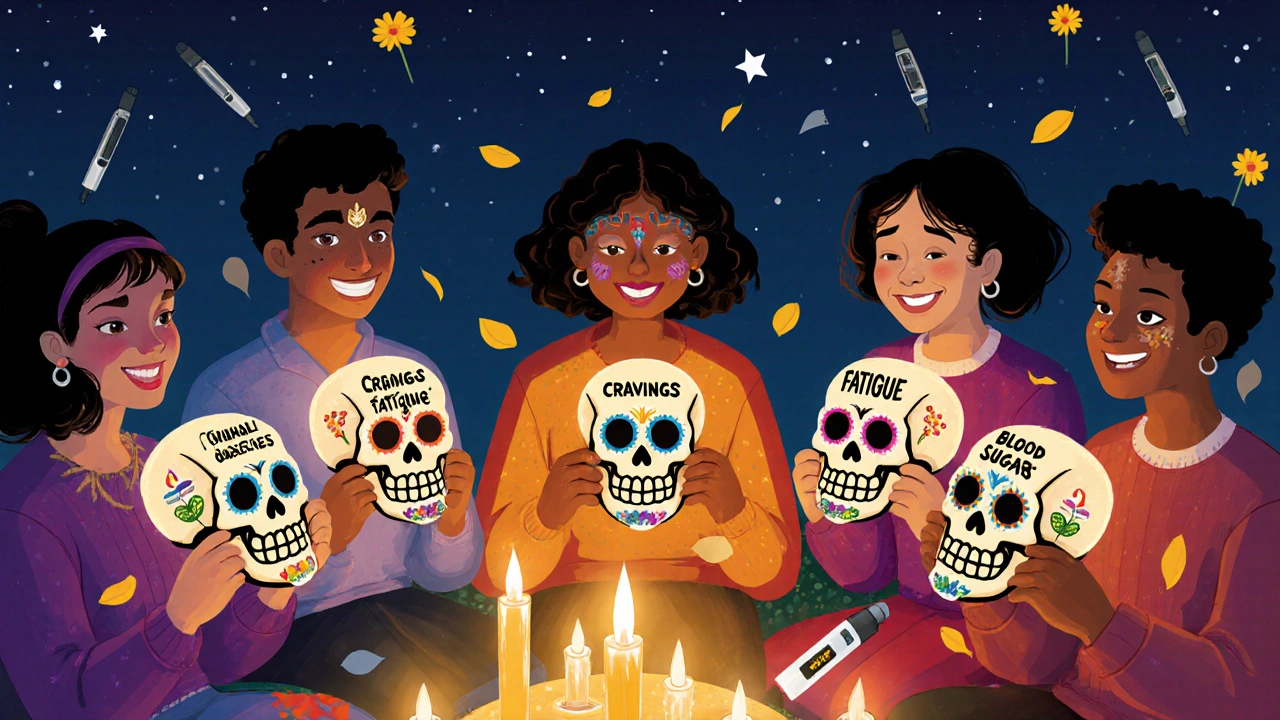Living with type 2 diabetes isn’t just about checking blood sugar or counting carbs. It’s about changing how you eat, move, sleep, and think-day after day. And that’s where most people hit a wall. Medications help, but they don’t fix the loneliness, the frustration, or the burnout that comes with managing a chronic condition alone. That’s where support groups step in-not as a replacement for doctors, but as the missing piece many never knew they needed.
Why Diabetes Management Feels So Isolating
Think about it: you’re told to avoid sugar, but your coworker brings donuts every Friday. You’re told to walk 30 minutes a day, but you’re exhausted from working two jobs. You’re told to check your blood sugar before meals, but you forget in the middle of picking up your kids from school. These aren’t just inconveniences-they’re daily emotional battles. And when you’re the only one in your family or friend circle dealing with this, it’s easy to feel like you’re failing.
A 2024 study from the American Diabetes Association found that nearly 60% of people with type 2 diabetes report feeling isolated in their journey. That’s not just sadness-it’s a real barrier to sticking with treatment plans. People who feel alone are 3 times more likely to skip medications, delay doctor visits, or give up on lifestyle changes altogether.
What Happens in a Diabetes Support Group?
These aren’t formal therapy sessions. You won’t be asked to sit in a circle and share your deepest fears. Most groups meet once a week-online or in person-and they’re led by a trained peer, not a clinician. The structure is simple: people show up, talk about what happened this week, and listen to others.
One woman in Dallas told me she started going after her A1C hit 9.8. She didn’t say much the first two weeks. But when someone else mentioned they’d started walking after dinner and lost 12 pounds, something clicked. She tried it. Then she brought her husband. Now, six months later, her A1C is 6.2.
Groups cover real stuff: how to handle cravings at night, what to say when your doctor suggests insulin, how to explain your condition to your boss without sounding like you’re making excuses. They share recipes that actually taste good. They swap stories about blood sugar spikes after stress. They celebrate small wins-like skipping the soda for a whole week.
The Science Behind Peer Support
It’s not just feel-good talk. There’s hard data behind it. A 2023 meta-analysis in The Lancet Diabetes & Endocrinology looked at 42 studies involving over 5,000 people with type 2 diabetes. Those who joined regular peer support groups saw an average drop of 0.7% in their A1C levels-similar to what you’d get from adding a new medication. And the benefits lasted longer than with drugs alone.
Why? Because support groups change behavior through social accountability. When you know someone is asking, “How was your walk this week?” you’re more likely to go. When you hear someone else say they stopped drinking soda after seeing their numbers drop, you think, “Maybe I can too.” It’s not about being told what to do-it’s about seeing someone like you do it.
Support groups also reduce stress, which directly impacts blood sugar. Cortisol, the stress hormone, raises glucose levels. People in support groups report lower stress scores on standardized scales. That’s not magic-it’s connection.

Types of Support Groups You Can Find
Not all groups are the same. Here’s what’s out there:
- Hospital-based groups: Often led by diabetes educators. Structured, educational, sometimes free. Good if you need facts along with empathy.
- Community center groups: Run by local nonprofits or churches. Usually free. More casual. Great for building local friendships.
- Online forums: Like Diabetes Daily or Reddit’s r/Type2Diabetes. Available 24/7. Helpful for late-night panic moments when no one else is awake.
- App-based communities: Apps like MySugr and Glucose Buddy have built-in user groups. You can message others who’ve had similar blood sugar patterns.
- Specialized groups: For older adults, pregnant women with gestational diabetes that turned into type 2, or people with mobility issues. These address unique challenges you won’t find in general groups.
Some groups are faith-based. Others are led by people who’ve reversed their diabetes. Some focus on nutrition. Others on movement. You don’t have to join them all-just find one that feels like home.
What to Look For (and What to Avoid)
Not every group is helpful. Here’s how to tell the difference:
- Good signs: People share real stories, not just textbook advice. The group doesn’t shame anyone for slipping up. There’s a mix of experience levels. Someone might say, “I had a bad week too-here’s what got me back on track.”
- Red flags: Someone pushes supplements as a cure. Someone claims insulin is “toxic.” The group feels like a sales pitch for a diet plan or device. If it sounds too good to be true, it is.
Real support doesn’t promise miracles. It says: “I’ve been there. You’re not broken. Let’s figure this out together.”

How to Find a Group Near You
You don’t need to search forever. Start here:
- Ask your endocrinologist or diabetes educator. Most have a list of local groups.
- Check the American Diabetes Association’s website-they list over 1,200 peer-led groups across the U.S.
- Search Facebook for “Type 2 Diabetes Support [Your City].” Many local groups are there.
- Call your local YWCA, YMCA, or senior center. They often host free health groups.
- Try the CDC’s National Diabetes Prevention Program-it includes peer support as part of its lifestyle coaching.
If you’re shy, start with an online group. Read for a week. Then post one thing: “I’m new. Any tips for handling sugar cravings after dinner?” You’ll be surprised how many reply.
What If No One in My Life Gets It?
That’s normal. Most family members mean well-they say “Just eat less sugar!” like it’s a choice. But they don’t understand the constant mental load: the insulin pens, the finger pricks, the midnight snacks to avoid lows, the guilt when you eat a slice of cake.
Support groups are where you stop explaining. Where you don’t have to justify why you’re not eating the birthday cake. Where someone says, “I did that last month. I felt awful afterward. Here’s what I learned.”
You don’t need your spouse to get it. You just need one person who’s been there.
Real Change Happens in the Quiet Moments
The biggest shift isn’t the drop in A1C. It’s when you stop seeing diabetes as your enemy-and start seeing it as something you’re learning to live with, not fight alone. It’s when you realize you’re not weak for struggling. It’s when you help someone else, and for the first time, you feel like you’re not just a patient. You’re a person.
One man in Texas joined a group after his wife left him because she couldn’t handle his “fixation” with blood sugar. He didn’t talk for three weeks. Then he shared that he’d started cooking for himself again. Someone replied, “I did that too. Here’s my favorite black bean recipe.” He still goes every Tuesday. He says it saved his life-not because of the food, but because he stopped feeling invisible.
Type 2 diabetes doesn’t get easier. But you don’t have to do it alone anymore.
Can support groups replace my doctor or medication?
No. Support groups don’t replace medical care. They complement it. You still need regular check-ups, blood tests, and prescribed medications. But support groups help you stick to those treatments by reducing stress, improving motivation, and giving you practical tips from people who’ve been there. Think of them as your emotional and behavioral backup team.
Are online support groups as effective as in-person ones?
Yes-for many people, they’re more effective. Online groups offer flexibility, anonymity, and access to people across the country who’ve faced the same struggles. A 2024 study found that people in online diabetes groups were just as likely to improve their A1C as those in face-to-face groups. The key is consistency. If you’re active in the group, even through text, you’ll see results.
What if I’m embarrassed to talk about my blood sugar numbers?
You don’t have to share numbers at all. Many people just say, “I’ve been having a hard time with highs lately,” or “I keep crashing after lunch.” That’s enough. Support groups are about sharing experiences, not medical records. No one will pressure you to disclose details you’re not ready to share.
Can I join a group if I’m not very tech-savvy?
Absolutely. Many groups meet in person at libraries, community centers, or churches. If you prefer phone calls, some organizations offer weekly check-in calls led by trained volunteers. You don’t need a smartphone or an app to benefit from peer support. All you need is the willingness to show up.
How do I know if a support group is right for me?
Try three different ones. Some feel too clinical. Others too casual. The right one will make you feel heard, not judged. You should leave feeling lighter, not more tired. If you don’t click with the first group, keep looking. It’s not about the format-it’s about the connection. You’ll know it when you find it.


Patrick Merk
November 15, 2025 AT 01:14Man, I wish I’d found this five years ago. I used to think my diabetes was just a personal failure-like if I were stronger, I’d just ‘do better.’ But the truth? It’s not about willpower. It’s about having people who get the midnight glucose checks and the guilt over birthday cake. I joined a Zoom group last year after my A1C hit 8.9. Didn’t say a word for three weeks. Then someone shared they started walking after dinner with their dog. I got a pup. Now I’ve lost 22 pounds and my A1C’s at 6.1. Not magic. Just company.
Vera Wayne
November 16, 2025 AT 07:11This is so true!! I’ve been in a local group for 14 months now, and honestly? It’s the only thing that’s kept me from giving up. No one judges me for having a bad week. They just say, ‘Hey, I had one last Tuesday-here’s what helped me.’ And that’s all I needed. You’re not broken. You’re just human. 💛
Rodney Keats
November 16, 2025 AT 16:02Support groups? Yeah, right. Next you’ll tell me crying into my insulin pen is ‘therapeutic.’ I’ve got a 9-to-5, two kids, and a wife who thinks ‘low sugar’ means ‘no sugar.’ If I had time for group therapy, I wouldn’t be here in the first place.
Erika Lukacs
November 17, 2025 AT 07:24There’s a quiet dignity in shared suffering, isn’t there? Not the performative kind you see on Instagram with #DiabetesWarrior selfies. But the real kind-the kind where you don’t speak for ten minutes, then someone says, ‘I had a spike after that taco truck,’ and you nod because you’ve been there. No solutions offered. No advice. Just presence. That’s the therapy.
Laura-Jade Vaughan
November 18, 2025 AT 01:38OMG YES!! I joined an app group last month and I swear, it’s like finding your soulmates in the diabetes universe 🥹✨ I posted a pic of my blood sugar graph after eating a croissant (I know, I know) and 17 people replied with their own ‘croissant trauma’ stories. One even sent me a recipe for almond flour croissants. I cried. In a good way. 😭🫶
Jennifer Stephenson
November 18, 2025 AT 20:56Support groups help. They are useful.
Segun Kareem
November 20, 2025 AT 11:37Let me tell you something-this isn’t just about blood sugar. This is about dignity. In Nigeria, we don’t talk about chronic illness like this. People think diabetes means you’re lazy or greedy. But when I found my group online, I realized I wasn’t broken-I was surviving. Now I help others in Lagos find the same groups. We don’t have fancy apps. We use WhatsApp. But we have each other. And that’s enough.
Philip Rindom
November 21, 2025 AT 11:31Wow. I was gonna say something snarky like Rodney, but… nah. This actually hit me. My dad had type 2. He never talked about it. Just hid his meds, ate cake when no one was looking. I didn’t get it until I got diagnosed. I wish he’d had a group. Maybe he wouldn’t have gone so quietly.
Jess Redfearn
November 23, 2025 AT 00:22Wait so you’re telling me I don’t have to do this alone? I thought I was just supposed to suck it up and count carbs like a robot. This is wild. Can I join your group? I’ll bring snacks. (Low carb, obviously.)
Ashley B
November 23, 2025 AT 22:29Support groups? Cute. But have you seen the FDA’s 2023 whistleblower report on diabetes nonprofit funding? These groups are run by Big Pharma shills who push insulin because they get kickbacks. And don’t get me started on the ‘peer leaders’-90% of them are ex-reps from Eli Lilly. You think you’re getting help? You’re being groomed for lifelong dependency.
Scott Walker
November 25, 2025 AT 17:18I joined a group after my dad passed. He never talked about his diabetes either. I thought I was just grieving. Turns out I was also grieving the loneliness of it all. Now I go every Thursday. We don’t even talk about numbers. Just what we ate, how we slept, and if we felt like crap that day. It’s not therapy. It’s just… breathing together.
Sharon Campbell
November 27, 2025 AT 15:22lol support groups. like i need another thing to do. i got work, kids, and a life. why do people make this so complicated? just eat less sugar and walk. its not rocket science.
sara styles
November 28, 2025 AT 09:10Let me break this down for you: peer support groups are a distraction tactic designed by the medical-industrial complex to keep you compliant while they profit from your lifelong dependency. The real solution is ketosis, fasting, and avoiding all pharmaceuticals. The 0.7% A1C drop? That’s placebo effect amplified by groupthink. The Lancet study? Funded by ADA. You think they’d publish anything that showed support groups are useless? Please. The truth is buried under layers of corporate PR and emotional manipulation. You’re being sold a fantasy wrapped in a hug.
Brendan Peterson
November 30, 2025 AT 03:42Interesting data, but the meta-analysis doesn’t account for confounding variables-like socioeconomic status or baseline health literacy. Also, the 0.7% drop is statistically significant but clinically marginal. You’d get better results from a GLP-1 agonist. And let’s not romanticize peer support. It’s not a substitute for structured education or consistent clinical care.
Jessica M
December 1, 2025 AT 22:32Thank you for this thoughtful and well-researched piece. I am a certified diabetes care and education specialist and have facilitated over 200 support groups across three states. The emotional and behavioral impact of peer connection is profound and measurable. I encourage all patients to seek out a group that aligns with their needs. Consistency, not perfection, is the goal.
Eric Gregorich
December 2, 2025 AT 18:30You know what’s really wild? We treat diabetes like it’s a moral failure. Like if you just had enough willpower, you’d magically fix it. But we don’t say that about cancer or MS. Why? Because those diseases don’t come with a ‘you did this to yourself’ stigma. Support groups don’t fix your pancreas. But they fix your soul. And sometimes, that’s the only thing that lets you keep going. I’ve been on insulin for 12 years. I’ve had my A1C between 6.0 and 7.5 for the last five. Not because I’m perfect. But because I have people who don’t look at me like I’m a disappointment. I have people who say, ‘I’m tired too.’ And that’s the medicine that never runs out.
Koltin Hammer
December 3, 2025 AT 21:42There’s something ancient about this, isn’t there? Tribal circles. People sitting around a fire, sharing stories not to fix each other, but to say, ‘I see you.’ We were never meant to face chronic illness alone. Our ancestors didn’t isolate their sick. They held them. Now we hand out pills and tell people to ‘stay positive.’ Support groups? They’re not a trend. They’re a return. A reweaving of the social fabric that modern medicine tore apart in its rush to quantify everything. The A1C drops? That’s just the side effect. The real healing is when you stop feeling like a patient and start feeling like a person again.
Liam Dunne
December 5, 2025 AT 08:48Just wanted to say-my group meets at the library every Thursday. No apps, no Zoom, just chairs and coffee. I didn’t speak for two months. Then I said, ‘I hate checking my sugar before dinner.’ Someone said, ‘Me too. I do it while I’m microwaving my leftover rice.’ That’s it. No advice. Just a shared moment. I’ve been going for a year now. My A1C’s down. But more than that? I don’t feel so alone anymore.